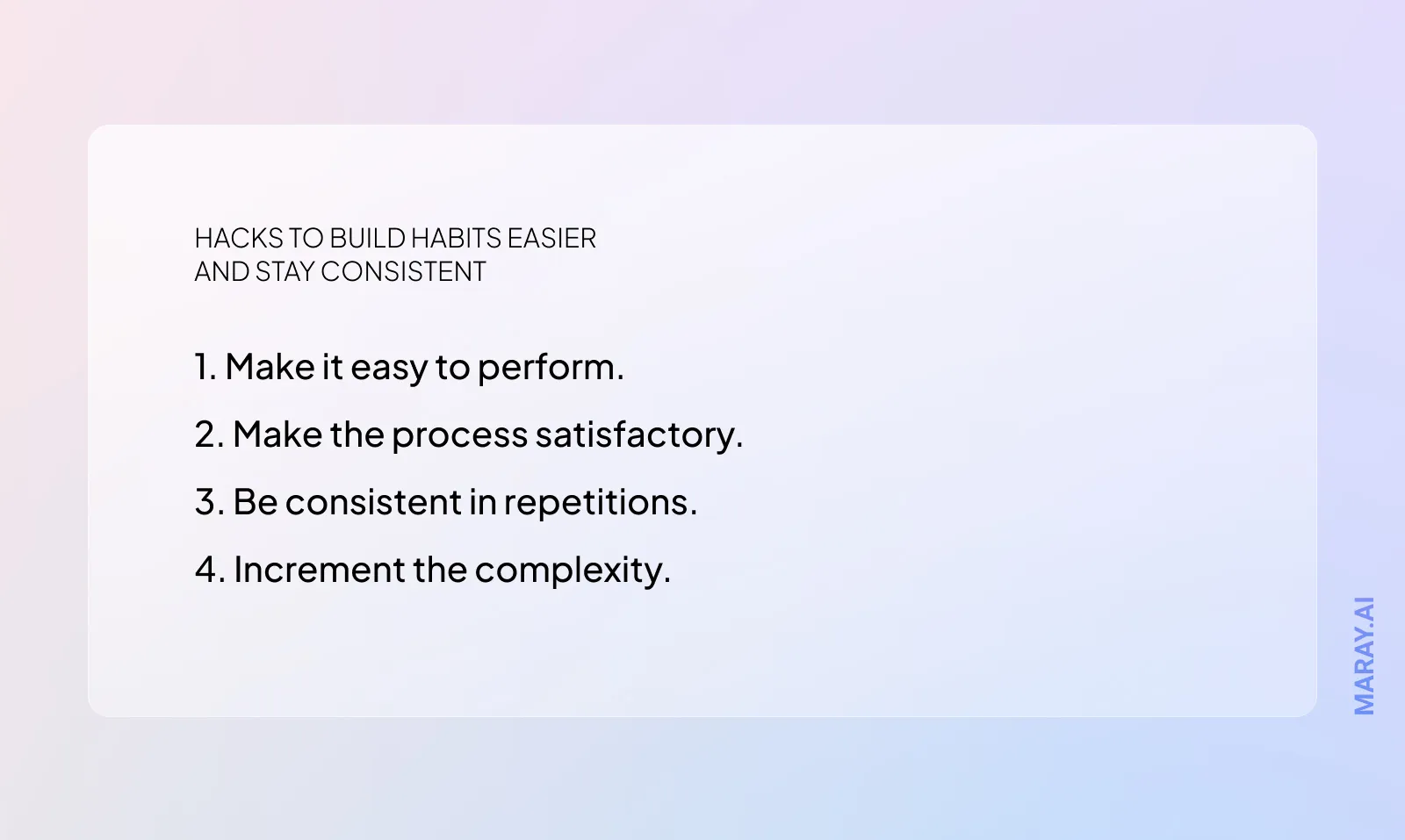Today I am going to show you how to build productive daily journaling with Notion and explain what kind of benefits it can invoke on your life.
I've tried <p-underscore>daily journaling<p-underscore> multiple times without success until I started using Notion to build my productive morning and night routines.
In fact, journaling in Notion became a catalyst for me. It made me consistent with my habits, projects, and self-reflection.
Since I started journaling in Notion I published 40 articles on my blog, became more productive at work, learned how to develop an app in iOS and started to organize my life more systematically.
###### You can duplicate the daily journal template and follow along.
.webp)
## Daily journal template in Notion
My Notion journal is divided by the time of the day. I spend 5-10 minutes in the morning and 2-3 minutes in the evening.
In the morning I try to set the mood for the day: exercise, write what I am grateful for, outline a few tasks I want to focus my mind on and review the day's schedule.
The night routine consists of reviewing the day and setting up the schedule for tomorrow. I also write my thoughts, impressions, and curious things I learned or stumbled upon.
### Notion journal template

Here's how my daily journal entry looks like. It might appear complex or difficult to perform, but it's actually quite simple. The whole structure of the journal is a template. The only thing you have to do is to fill in the answers to the points and questions.
That's the beauty of Notion. It helps to make it as easy as possible. I tried to do the same with Evernote, but it was too difficult to perform and the habit didn't stick.
### Simplified journal template in Notion

This is the simple version of the template for those who are just starting out. The key is to keep it simple until you form a habit, otherwise, it won't stick.
## How daily journaling promotes growth
<p-frame>One of the most valuable insights I had in the last couple of years is that small consistent improvements lead to a **significant change** in the future.<p-frame>
Compounding effect works not only in investment but also in personal growth.
A year ago I had no healthy habits, no discipline and felt terrible. I didn't have proper set goals, enjoy what I am doing or have a meaning in my life.
Since I started to journal in Notion, a lot of things changed.
I learned how to set and track goals, build healthy habits, and find what I enjoy doing. How did I achieve that?
First of all, I **structured my day and built discipline through consistent journaling**. The secret was, as I say many times, to start small and then bundle many other habits. Once I made daily journaling a habit, it was much easier to perform other habits such as writing, scheduling and working on my side projects.
Second, that consistency led me to better planning and execution. I started to write blog posts every week and it resulted in growing my blog from 0 to 1500 viewers a month.
Last but not least, all of these changes inspired me to be more productive in other areas and don't fall into the procrastination pit like I used to.

That's how my daily journal database looks like. All the entries I make in the morning and throughout the day are pages that are stored chronologically.
I like to think about it as my **personal growth journal**. I can always see if I am not consistent or slow with my tasks and habits so that I can correct my course of actions to get back on track.
As you can see I still have room to grow with consistency, but overall it's pretty impressive progress considering how disorganized I was a year ago.
Daily journaling was the little step I took to trigger a positive chain reaction in my life and work. And I believe everyone can do it too.
Since the morning routine is the hardest part, in the next couple of chapters I'll explain how to get going and how to make it work.
## How to get started with a morning routine
For a long time, I used to wake up late to have just enough time to get ready and commute to work. I called myself a late-night sleeper and hated mornings until I started to practice my morning routine.
Instead of wasting time, your structured morning routine will create **momentum for the whole day** ahead. It will help you to control your life, set priorities, and make your time productive.
A morning routine is a habit. Like any other healthy habits, it is hard to build. However, several tips help to make the process easier.
Habit building frameworks revolve around two crucial points: **make it rewarding and low-cost**. Your midbrain reward economy evaluate the reward and the cost and decides whether the new behaviour is beneficial or not.
Here are 4 hacks to make your morning routine as easy to start as possible.
1. **Make it easy.** Your brain does not want changes until it is beneficial to your well-being and survival. Changes in the neural structure are expensive energy-wise. They will not be motivated until it is either easy to perform or have instant rewards. Anything long-term is considered high-cost. The limbic system in the brain prefers to be satisfied now than later. Therefore, start small and make it easy.
2. **Make it satisfactory.** The ancient part of the brain, the limbic system, wants rewards and satisfaction. That is why instant gratification is so addictive. It is low-cost and highly pleasurable for the brain's reward system. To make a habit stick, you have to make it appealing. Reward yourself with something enjoyable once you finish your routine or a part of it. For instance, my reward is a breakfast with a coffee plus the checkboxes in the journal I keep. It is satisfactory to have all the boxes checked. However, there will be days when you cannot complete your morning routine. It brings the following point.
3. **Be consistent.** Even when you cannot go through the whole process, try to make the bare minimum. Repetition is more important than quality. To make the habit stick, you have to perform it for at least 60-70 days. Once you automate a task, you can work on the quality. It is okay to miss a day. The key is to start your next streak immediately. Once you miss 2 days straight, the chances are you are going to lose the grip.
4. **Increment the complexity.** Once you feel comfortable, make the routine more challenging. The more you repeat, the more neural connections you form. More neural synapses mean more automation and less spent energy. Increasing complexity promotes growth but is still manageable and not energy-consuming.
To learn more about motivation and habits, refer to the article about the [brain's reward system](https://www.maray.ai/posts/motivation-reward-system-economy) and read Atomic Habits book.

## How to prepare your morning routine
Write down a specific instruction for yourself. A step by step guide. Think about how you can make it simple, yet consistent. Once you wake up you will know exactly what you have to do.
**Here is how my morning flow looks like in detail.**
1. Wake up by 6.
2. Drink a glass of water.
3. Open the curtains to let in light.
4. Brush teeth.
5. Wake up my body with 1 exercise.
6. Start my daily journal.
7. Productive 1 hour work.
Waking up is the hardest, but it gets much easier after that. Once I am out of my warm and cozy bed, I am in the flow and the rest of the steps are not difficult to perform at all.
> “At dawn, when you have trouble getting out of bed, tell yourself: ‘I have to go to work – as a human being. What do I have to complain of, if I’m going to do what I was born for – the things I was brought into the world to do? Or is this what I was created for? To huddle under the blankets and stay warm?’” — Marcus Aurelius
The more specific you are with your morning flow, the better chances you will do it. Do not overwhelm yourself. The key is to give your brain some time to get used to the changes.
To sum up, start an easy morning routine that will get you going. Next, increment the complexity and adjust the process to your own needs.
## Final thoughts
Daily journaling can be many things and Notion is flexible enough to provide a variety of uses to different people. For some, it's daily entries of thoughts and ideas. For others, it's about structuring your day, scheduling, and writing.
In any case, try to be consistent with your work and you'll see positive changes quite soon.
Now you know everything to successfully create and perform a daily journal with a morning routine. Copy the Notion [Daily Journaling template](https://maray.gumroad.com/l/hAbns) and make your first step in creating a productive morning routine.






